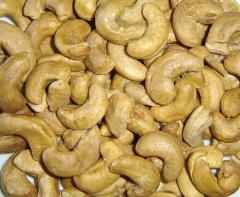Cashew Nuts
| Infobox on Cashew Nuts | |
|---|---|
| Example of Cashew Nuts |  |
| Facts | |
| Origin | |
| Stowage factor (in m3/t) | |
| Humidity / moisture | |
| Ventilation | |
| Risk factors | |
Cashew Nuts
Description
The cashew nut is the kidney-shaped fruit, complete with shell, of the cashew tree, usually shipped in bags. Cashew kernels, the kernels obtained from the nut, are usually shipped in tins, inside cartons.
Applications
The cashew nut is a popular snack, and its rich flavor means that it is often eaten roasted, on its own, lightly salted or sugared, or covered in chocolate.
Shipment/storage
Raw cashew nuts are subject to damage by moisture and may deteriorate after long storage in an undried state. Nuts may usually be expected to contain some bad kernels. Raw nuts are often imported and re-exported as kernels; for example, nuts are imported into India from East Africa, and then re-exported with kernels of nuts grown in India. It is generally not possible to state definitely whether cashew kernels, when completely processed are of new or old crop or, other than in exceptional circumstances, whether they are from nuts of Indian or African origin. Kernels of one grade should be of an even size, but some degree of tolerance is allowed.
Kernels should be packed dry; if they are insufficiently dry they may deteriorate, and if in a really damp condition they may become caked, rancid and discolored, but if packed too dry whole kernels may sustain breakage. Rough handling may damage cartons and tins and cause breakage of kernels. Contact with water may cause discoloration of cartons and rusting of tins, but contents should be unaffected. Kernels are liable to infestation by beetles, moths, larvae, etc., due to improper packaging and not necessarily from external causes. Contents of tins are not expected to suffer loss in weight. Both cashew kernels and the oil contained in cashew nuts are highly inflammable.
Cashew kernels can be stored under normal conditions for long periods of time without significant deterioration.
The following features are significant when assessing the damages (loss) in cashew shipments:
1. Crushing – staining of bags – often resulting in C&F Agents tending to reject these as damaged lots.
2. Rain water affect during loading/discharge period at both load/disport in the tropical belt: sudden tropical rain showers are a common occurrence.
3. Defective containers with leaking roof/panels being used for cashew.
4. Excessive condensation in containerised shipment owing to:
- inherent high moisture of raw cashew
- Humidity/temperature in the container as compared to ambient temperature/condition outside.
5. Lack of proper ventilation in normal containers which are usually stuffed to 90% capacity, i.e. block stowage.
Recommended carriage temperature: 5 - 25°C. Temperatures > 30°C should not prevail for a long period, as such temperatures promote respiration of the cargo and cause self-heating.
Cashew nuts in bags are at risk of moisture penetration and mold formation due to ship/container sweat. The goods may cake, turn rancid and discolor.
Risk factors
- Self-heating / Spontaneous combustion
- Hydrolytic/enzymatic/oxidative fat cleavage
- Odor
- Contamination
- Mechanical influences
- Toxicity / Hazards to health
- Shrinkage/Shortage
- Insect infestation / Diseases
Note: (Source including Transport Information Service of the GDV)











